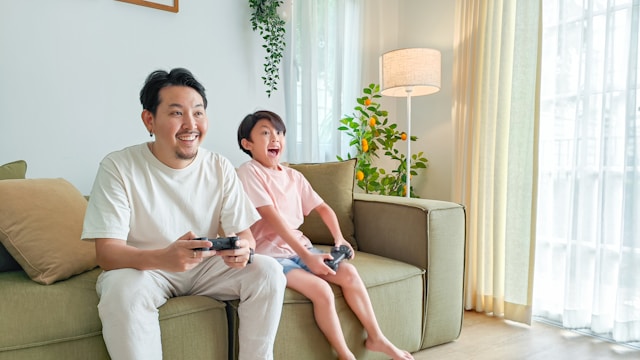Gaming these days is a huge part of popular culture and offers more than just entertainment–it can actually be good for mental health! Contrary to what some people think, gaming can provide numerous benefits for the mind, making it a valuable and enjoyable pastime for many. So in this post, we’ll be exploring some of those benefits to help encourage you to give gaming a try.

Source: Unsplash (CC0)
Boosting Cognitive Skills
One of the most significant benefits of gaming is its ability to improve cognitive skills. Video games often require players to solve puzzles, make quick decisions, and think strategically. For example, strategy games challenge players to plan ahead and manage resources effectively. These games require a lot of brainpower, and players often have to think several steps ahead to succeed. This kind of mental exercise can help improve memory, problem-solving skills, and overall cognitive abilities.
Furthermore, cognitive improvements are not limited to strategy games. Many other genres, like puzzle games, also engage the brain in meaningful ways. When faced with complex puzzles, players must use logic and reasoning to find solutions, enhancing their critical thinking abilities. Engaging in these types of games regularly can provide a workout for the brain, keeping it sharp and agile. The benefits extend beyond just the game, as these enhanced cognitive skills can be applied to everyday tasks and challenges, making players more adept at handling real-world problems with greater ease and creativity.
Enhancing Problem-Solving Abilities
Many video games are built around solving problems and overcoming challenges. These games force players to think critically and come up with creative solutions. This kind of gameplay can be especially beneficial for developing problem-solving skills. When players encounter difficult levels or puzzles, they learn to persevere and try different approaches until they find a solution. This persistence and adaptability can be applied to real-life situations, making gamers better problem solvers in general.
Additionally, the problem-solving skills gained from gaming aren’t limited to tackling in-game challenges. They can extend to various aspects of life, such as academic work, professional tasks, and personal projects. By regularly engaging with complex scenarios and learning to break down problems into manageable parts, gamers can enhance their ability to approach real-world issues methodically. This experience can help build resilience and resourcefulness, enabling individuals to handle setbacks and unexpected difficulties more effectively. The confidence gained from solving intricate gaming challenges can also empower players to take on new challenges in their everyday lives with a positive and proactive mindset.
Improving Mood and Happiness
Playing video games can also lead to increased happiness. Achieving goals, whether it’s completing a difficult level or earning a new high score, can boost mood and provide a sense of accomplishment. Games that allow players to use their creativity to build and explore can be very fulfilling. Additionally, many games have engaging stories and characters that players can become emotionally invested in, providing an enjoyable and immersive experience.
Furthermore, the immersive nature of video games can provide a welcome escape from daily stresses and challenges. This immersion can lead to moments of joy and excitement as players navigate new worlds, solve intricate puzzles, or engage in thrilling adventures. The positive emotions experienced during gameplay can extend beyond the screen, enhancing overall well-being and contributing to a more positive outlook on life. The satisfaction of overcoming in-game challenges and the joy of creative expression can collectively improve mood, making gaming a valuable tool for enhancing happiness and mental health.
Developing Fine Motor Skills
Video games can also help improve fine motor skills and hand-eye coordination. Many games require precise movements and quick reflexes. Action games, for instance, require players to aim and act accurately while moving quickly. These types of games can help develop better hand-eye coordination and fine motor skills, which can be beneficial in everyday tasks.
Additionally, the repetitive nature of these precise movements in gaming can lead to significant improvements over time. As players navigate through complex scenarios, they practice and refine their motor skills, making their movements more efficient and controlled. This can translate into better performance in real-world activities that require dexterity and coordination, such as playing a musical instrument, typing, or even participating in sports. The enhancement of these skills through gaming can therefore contribute to improved physical abilities and better overall motor function in daily life.
To help build on these fine motor skills, the use of specialized equipment can create a more immersive environment when playing. For instance, flight simulators are all the rage, whether they are used by pilots or regular gamers, and with the use of Honeycomb Aeronautical equipment, they can create a better experience that will keep them on their toes.
Reducing Stress and Anxiety
Gaming can also be an excellent way to relax and unwind. Many people find that playing their favorite games helps them escape from the stresses of daily life. Games can provide a sense of achievement and progress, which can be very satisfying. By allowing players to create their own virtual worlds and complete simple tasks at their own pace, this type of game can be very soothing and help reduce feelings of stress and anxiety.
Moreover, the immersive nature of many games can act as a distraction from worries and anxieties. Engaging in gameplay can shift focus away from stressful thoughts, providing a mental break and allowing players to recharge. The interactive and goal-oriented aspects of games can also offer a sense of control and accomplishment, which is particularly beneficial for those feeling overwhelmed by real-life pressures. By achieving small victories in a game, players can experience boosts in mood and self-esteem, which can contribute to overall mental well-being and help manage stress more effectively.
Encouraging Social Interaction
Despite the stereotype of the lone gamer, many video games are actually very social. Online multiplayer games allow players to connect with friends and even make new ones. These games often require teamwork and communication, which can help improve social skills. Additionally, many gamers form communities around their favorite games, whether through online forums, social media, or in-person events. These communities can provide a sense of belonging and support, which is essential for mental health.
Moreover, gaming communities often foster inclusive and supportive environments where players can share their experiences and collaborate on strategies. This social interaction can be particularly valuable for individuals who may find it challenging to connect with others in traditional settings. By participating in these communities, gamers can build meaningful relationships and improve their interpersonal skills. The sense of camaraderie and mutual support found in gaming groups can also help alleviate feelings of loneliness and isolation, contributing to a healthier and more connected social life.
Engaging in Different Types of Games
Different types of games can offer various mental health benefits. Puzzle games like Sudoku can help improve concentration and problem-solving skills. Role-playing games allow players to immerse themselves in rich narratives and complex characters, which can be very engaging and satisfying. Simulation games let players create and manage virtual lives, providing a sense of control and accomplishment. By engaging in a variety of games, players can enjoy a wide range of mental health benefits.
Additionally, engaging in different genres allows players to exercise different parts of their brain and develop a diverse set of skills. For example, puzzle games stimulate logical thinking and pattern recognition, while RPGs enhance empathy and emotional intelligence through storytelling and character development. Simulation games, on the other hand, can improve organizational skills and strategic planning. This variety not only keeps gaming interesting and enjoyable but also ensures a well-rounded mental workout, contributing to overall mental agility and well-being. By exploring multiple types of games, players can maximize the mental health benefits and enjoy a more enriching gaming experience.
Gaming Over the Years
Gaming has evolved significantly over the years, from the early days of simple arcade games to the complex and immersive experiences available today. The development of technology has allowed for more sophisticated graphics, sound, and gameplay mechanics. This evolution has not only made games more entertaining but also more beneficial for mental health. Modern games often incorporate elements that promote cognitive development, social interaction, and stress relief, making them a valuable tool for mental well-being.
Furthermore, the increased accessibility and variety of games have made it possible for people of all ages and backgrounds to find something they enjoy. This inclusivity has expanded the positive impacts of gaming, allowing more individuals to experience its mental health benefits. With the advent of online platforms, gamers can connect with others around the world, fostering a sense of community and support. The continual advancements in gaming technology ensure that games will continue to be an engaging and beneficial activity, contributing to mental health and well-being in increasingly diverse and innovative ways.
To conclude, gaming is and always will be beneficial for one’s mental health. Whether it’s about encouraging social interaction, boosting cognitive skills, improving one’s happiness and mood, or even helping to develop fine motor skills, there are so many unique benefits to video games. Games can be seen as tools to help people develop new skills, and they can also be seen as a surprisingly healthy hobby when enjoyed in moderation. In short, gaming has many unique benefits that are just waiting to be explored–so why not give it a try today?





